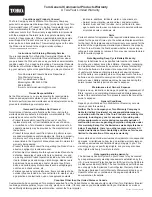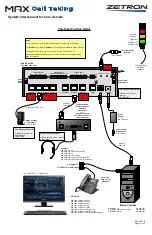
Operation of platform lift without parking brake
engaged can result in tip-over and personal
injury.
•
Always apply parking brake before operating
platform lift. The use of wheel chocks is
recommended.
•
Do not release parking brake while platform
lift is raised.
•
Do not raise the platform lift if the bubble is
outside of the operating region on the level
indicator.
Loss of control or tip-over will result if vehicle
is moved with platform in raised position and
may cause serious personal injury to operator
or bystanders.
•
Never move vehicle while platform is raised.
•
Always apply parking brake before raising
platform. Wheel chock use is recommended.
•
Never release parking brake while platform
is raised.
•
Check safety interlocks before each use of
platform. See operator’s manual for safety
interlock check instructions.
•
Never bypass safety interlocks.
•
Never allow riders on platform in any
position.
If lift does not operate:
•
Make sure vehicle key and lift key are in "Off"
position.
•
Make sure vehicle is parked on less than a 5
degree angle slope.
•
Make sure vehicle parking brake is "On".
6. When finished with work operation, lower lift all the
way down to stops and remove key from lift pendant
control to prevent operation when unattended.
Important:
If engine kills when releasing
parking brake, it may indicate that lift is not
completely lowered. Vehicle can not be driven
with lift raised at any height.
Contact between non-insulated platform lift
and power lines will cause electrocution.
•
Electrocution will cause serious personal
injury or death.
•
Never use platform lift near power lines.
•
Never allow platform lift to touch power
lines.
•
If power line contact occurs:
– Lower unit away from contact if possible.
– Do not touch power line.
– Never touch ground while touching
platform lift or power line.
– Jump clear if necessary, without touching
platform lift or power line.
•
If operating platform lift near electrical, high
pressure or any type of rotating equipment:
– Always disconnect power to that
equipment.
– Always use OSHA approved lock-out
devices.
•
Never use the platform lift during a thunder
or lightning storm.
Lower the platform lift and avoid open areas
in the event of threatening weather.
Emergency Lowering
1. Reach into access opening only to activate
emergency lowering valve.
2. Push in red knob on solenoid valve (Figure 24) and
rotate 180 degrees counter-clockwise to activate
emergency lowering valve.
17








































